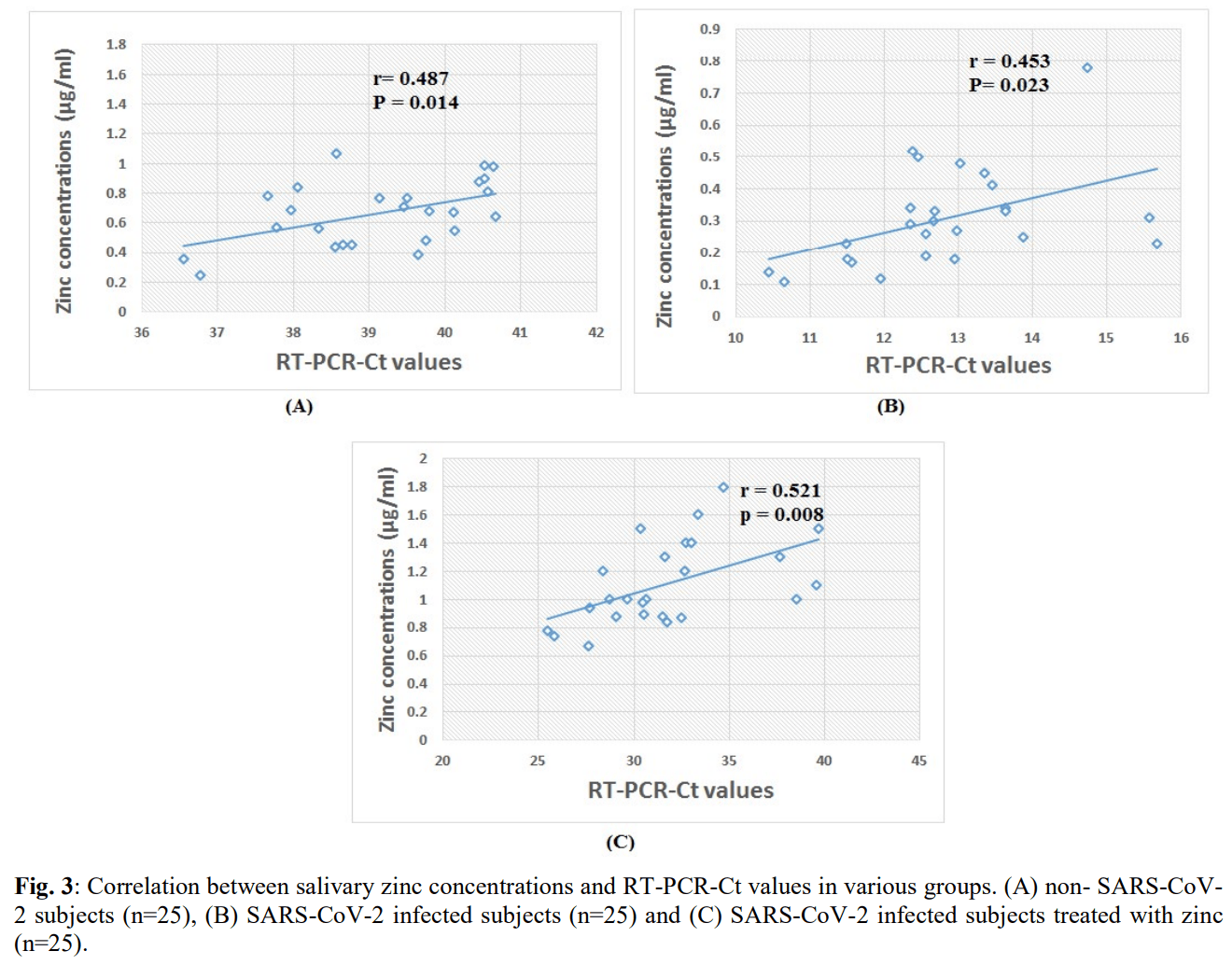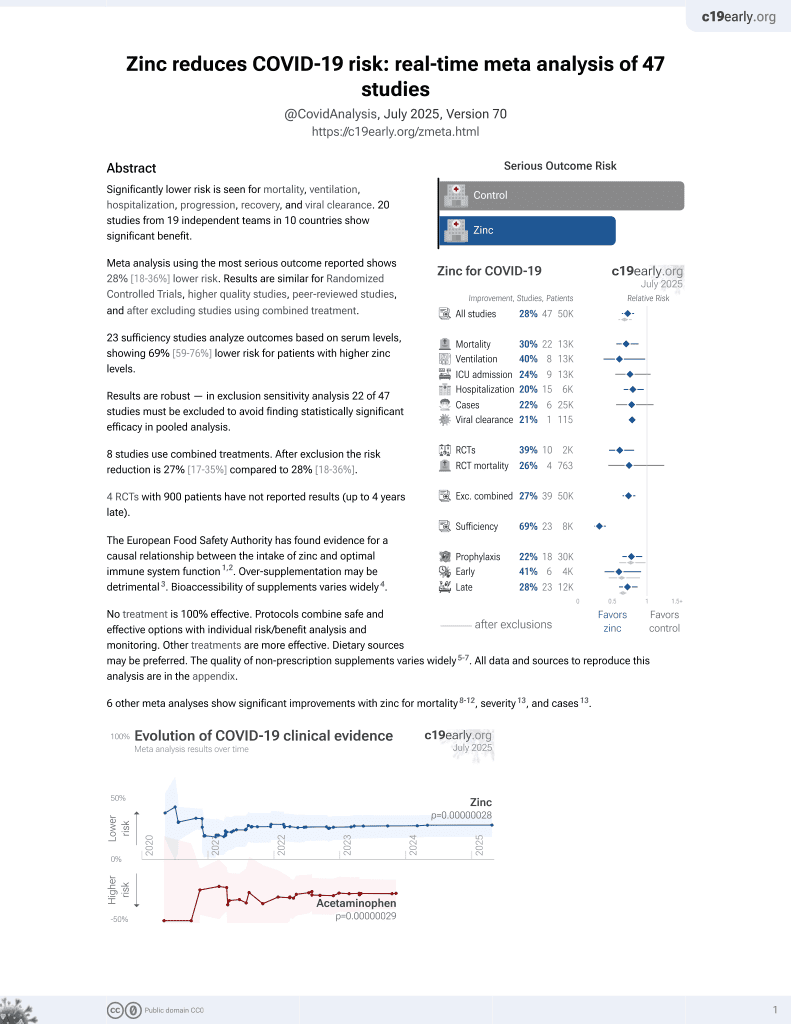
Clinical importance of zinc as monotherapy in modulating RT-PCR cycle threshold values and antibody levels in cases of COVID 19 patients
et al., Pakistan Journal of Pharmaceutical Sciences, doi:10.36721/PJPS.2023.36.4.REG.1031-1043.1, Jul 2023
Zinc for COVID-19
2nd treatment shown to reduce risk in
July 2020, now with p = 0.00000028 from 47 studies, recognized in 23 countries.
No treatment is 100% effective. Protocols
combine treatments.
6,400+ studies for
210+ treatments. c19early.org
|
Analysis of 75 patients in Saudi Arabia showing that zinc treatment increased salivary zinc levels and lowered the viral burden in COVID-19 cases. COVID-19 patients had lower salivary zinc levels compared to healthy controls. Salivary zinc levels correlated with viral load (measured by RT-PCR Ct values).
Ibrahim et al., 1 Jul 2023, retrospective, Saudi Arabia, peer-reviewed, 5 authors.
Clinical importance of zinc as monotherapy in modulating RT-PCR cycle threshold values and antibody levels in cases of COVID 19 patients
Severe acute respiratory syndrome coronavirus 2 (SARS-CoV-2) infection is globally concerning for overall health. The viral burden is diagnosed by the positive cycle threshold value (Ct-value) of the real-time reverse transcription polymerase chain reaction (RT-PCR) assay. So far, no effective therapy has been established for this viral infection. This research aims to investigate the impact of zinc therapy on viral burden, salivary zinc levels and serum specific antibody levels versus SARS-CoV-2 spike antigen in subjects with infection. The correlation between viral burden and salivary zinc levels was also studied. 75 participants were included, classified as 25 non SARS-CoV-2 healthy individuals, 25 SARS-CoV-2 patients and 25 SARS-CoV-2 patients receiving zinc sulphate daily for 30 days. Results revealed markedly low salivary zinc levels in SARS-CoV-2 cases, which were closely linked with a high viral burden versus healthy participants. Marked elevations in serum IgM, IgG, and IgG1 antibody levels in infected patients versus healthy participants were also noticed. Treatment with zinc markedly boosted the salivary zinc levels and lowered the viral burden in SARS-CoV-2 cases. Serum IgM, IgG and IgG1 antibody levels were downregulated in SARS-CoV-2 treated with zinc. Conclusion: Zinc therapy may be an efficient therapeutic approach for SARS-CoV-2 viral eradication.
References
Afjadi, Karami, Goudarzi, Alipourfard, Bahreini, The effect of vitamin D, magnesium and zinc supplements on interferon signaling athways and their relationship to control SARS-CoV-2 infection, Clin. Mol. Allergy
Almasaud, Chalabi, Arfaj, Qarni, Alkroud et al., Association of serum zinc and infammatory markers with the severity of Covid-19 infection in adult patients, Nutrients
Alqabbani, Albadr, Zinc status (intake and level) of healthy elderly individuals in Riyadh and its relationship to physical health and cognitive impairment, Clin. Nutr. Exp
Balboni, Zagnoli, Filippini, Sj, Vinceti, Zinc and selenium supplementation in COVID-19 prevention and treatment: a systematic review of the experimental studies, J. Trace Elem. Med. Biol
Bastos, Tavaziva, Abidi, Campbell, Haraoui et al., Diagnostic accuracy of serological tests for covid-19 systematic review and meta-analysis, BMJ
Beck, Levander, Host nutritional status and its effect on a viral pathogen, J. Infect. Dis
Beck, Matthews, Micronutrients and host resistance to viral infection, Proc. Nutr. Soc
Bonaventura, Benedetti, Miossec, Zinc and its role in immunity and inflammation, Autoimmun Rev
Chernecky, Berger, Laboratory tests and diagnostic procedures 5 th ed
Deshpande, Kaduskar, Deshpande, Bhatt, Yadav et al., Longitudinal clinico-serological analysis of anti-nucleocapsid and anti-receptor binding domain of spike protein antibodies against SARS-CoV-2, Int. J. Infect. Dis
Dhama, Dhawan, Tiwari, Emran, Mitra et al., COVID-19 intranasal vaccines: Current progress, advantages, prospects and challenges, Hum. Vaccines Immunother
Finzi, Treatment of SARS-CoV-2 with high dose oral zinc salts: a report on four patients, Int. J. Infect. Dis
Gammoh, Rink, Zinc in infection and inflammation, Nutrients
Gombart, Maggini, A review of micronutrients and the immune system-working in harmony to reduce the risk of infection, Nutrients
Guan, Yue, Bai, Wang, Yu et al., Clinical characteristics of coronavirus disease 2019 in China, N. Eng. J. Med
Hallmans, Absorption of topically applied zinc and changes in zinc metabolism during wound healing. An experimental and clinical investigation, Acta Derm. Venereo
Heller, Sun, Hackler, Seelig, Seibert et al., Prediction of survival odds in COVID-19 by zinc, age and selenoprotein P as composite biomarker, Redox Biol
Ik, Zinc-altered immune function, J. Nutr
Ingberg, Ahlstrand, Cajander, Sundqvist, Wegener et al., RT-PCR cycle threshold value in combination with visual scoring of chest computed tomography at hospital admission predicts outcome in COVID-19, Infect. Dis
Ishay, Kessler, Schwarts, Ilan, Antibody response to SARS-Co-V-2, diagnostic and therapeutic implications, Hepatol. Commun
Jothimani, Kailasam, Danielraj, Nallathambi, Ramachandran et al., COVID-19: poor outcomes in patients with zinc deficiency, Int. J. Infect. Dis
Kontou, Braliou, Dimou, Nikolopoulos, Bagos, Antibody tests in detecting SARS-CoV-2 infection: A meta-analysis
Li, Li, Immunologic Testing for SARS-CoV-2 Infection from the Antigen Perspective
Pal, Squitti, Picozza, Pawar, Rongioletti et al., Zinc and COVID-19: Basis of current clinical trials, Biol. Trace Elem. Res
Pasternak, A novel form of host defence: Membrane protection by Ca 2+ and Zn 2+, Biosci. Rep
Prasad, Malysa, Bepler, Fribley, The Mechanisms of zinc action as a potent anti-viral agent: The clinical therapeutic implication in COVID-19, Antioxidants
Prasad, Zinc in human health: effect of zinc on immune cells, Mol. Med
Pujadas, Chaudhry, Mcbride, Richter, Zhao et al., SARS-CoV-2 viral load predicts COVID-19 mortality, Lancet Respir. Med
Quiroga, Hern´andez, Casta˜neda, Jimenez, Vega et al., Contrasting SARS-CoV-2 RNA copies and clinical symptoms in a large cohort of Colombian patients during the first wave of the COVID-19 pandemic, Ann. Clin. Microbiol. Antimicrob
Rahman, Idid, Can Zn be a critical element in COVID-19 treatment?, Biol. Trace Elem. Res
Romero, Sanchez, Blanco, Rodríguez, Majem, Serum copper and zinc concentrations in a representative sample of the Canarian population, J. Trace Elem. Med. Biol
Shakoor, Feehan, Dhaheri, Ali, Platat et al., Immune-boosting role of vitamins D, C, E, zinc, selenium and omega-3 fatty acids: could they help against COVID-19?, Maturitas
Theel, Slev, Wheeler, Couturier, Wong et al., The role of antibody testing for SARS-CoV-2: Is there one?, J. Clin. Microbiol
To, Tsang, Leung, Tam, Wu et al., Temporal profiles of viral load in posterior oropharyngeal saliva samples and serum antibody responses during infection by SARS-CoV-2: an observational cohort study, Lancet Infect. Dis
Velthuis, Van Den Worm, Sims, Baric, Snijder et al., Zn 2+ inhibits coronavirus and arterivirus RNA polymerase activity in vitro and zinc ionophores block the replication of these viruses in cell culture, PLoS Pathogens
Walsh, Jordan, Clyne, Rohde, Drummond et al., SARS-CoV-2 detection, viral load and infectivity over the course of an infection, J. Infect
Warnes, Little, Keevil, Human coronavirus 229E remains infectious on common touch surface materials, mBio
Wessels, Rolles, Rink, The potential impact of Zinc supplementation on COVID-19 pathogenesis, Front. Immunol
Who, The world health report, Midwifery
Xu, Liu, Zou, Luo, Wu et al., Hypozincemia in Covid-19 patients correlates with stronger antibody response, Front Immunol
Yasui, Yasui, Suzuki, Saitou, Yamamoto et al., Analysis of the predictive factors for a critical illness of COVID-19 during treatmentrelationship between serum zinc level and critical illness of COVID-19, Int. J. Infect. Dis
Zou, Ruan, Huang, Liang, Huang et al., SARS-CoV-2 viral load in upper respiratory specimens of infected patients, N. Engl. J. Med
